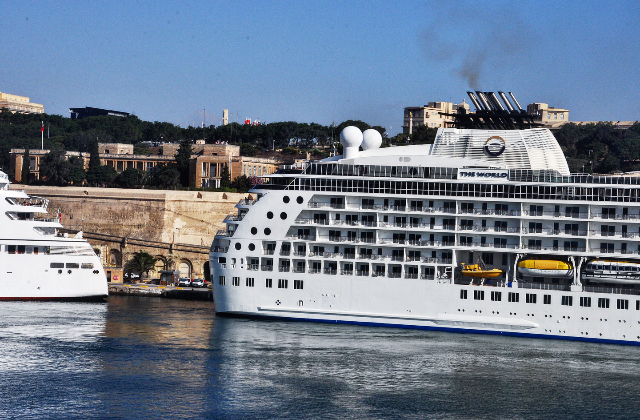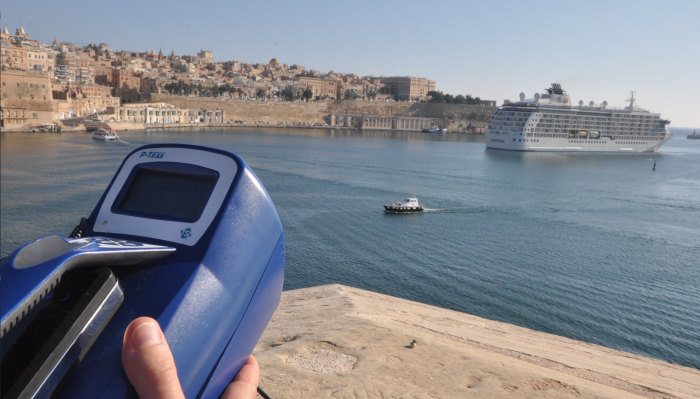Irrespective if they are cruise or container ships, ferries, or yachts – ships gather a broad range of fumes that emit a great deal of air pollutants causing damage to our climate, environment and health. The reason is mainly that seagoing vessels run on heavy fuel oil, which is highly charged in sulphur, as well as emit black carbon, heavy metals, fine particulates (primary and secondary), and sulphur dioxide in the air. The sulphur content of marine fuels is currently capped at a maximum of 3.5% (so called Heavy Fuel Oil, HFO). This is 3,500 times more than permitted in diesel fuel used in cars and trucks (0,001%).

In Malta – even though surrounded by sea and highly dependent on shipping traffic – knowledge and awareness on the problems resulting from ship emissions remain widely unknown and action from responsible government authorities is not being taken. Ships, vessels and other types of boats berthing in harbours which are often located in close proximity to dense urban areas, contribute massively to air pollution in these areas. Shipping air pollution can represent up to 40% of all Mediterranean coastal city air pollution. It represents a significant threat to human health, environment and climate. As pollutants are carried over long distances, it is not only the inhabitants of littoral zones but also the populations in inland regions, who are subject to respiratory issues as well as inflammations and cardiovascular diseases.
At BirdLife Malta, we are working on raising awareness about the issue of air pollution from ships since 2016 as part of the project “Together Against Air Pollution from Ships”.
Together with several Mediterranean environmental Non-Governmental Organisations including Cittadini per l’Aria (Italy), France Nature Environnement (France), Ecologistas en Acción (Spain), and our BirdLife partners Ornithologiki (Greece) and NABU (Germany) we follow the approach to raise national awareness and increase knowledge on air pollution from ships through activities and information sharing among the public, our members and relevant stakeholders in Malta.
Earlier this year, we organised a workshop on the topic of “Mediterranean Emission Control Area – A solution to reduce air pollution from ships in the region?” at the European Parliament, co-hosted by Maltese MEP Miriam Dalli and former Greek MEP Miltiadis Kyrkos leading to discussions on shipping as a major contributor to air pollution that has impacts on human health, the environment and the climate. Two scientific studies – recently published by the Government of France and the European Commission – highlight that socio-economic, environmental and climate benefits of the creation of an Emission Control Area (ECA) in the Mediterranean Sea outreach financial costs of a designation of the area by far. These impact studies mark a major step towards declaring the Mediterranean Sea as an ECA by the International Maritime Organisation (IMO) on an international level.
Declaring the Mediterranean Sea as an Emission Control Area is one of the many existing solutions. ECAs are declared areas under the International Convention for the Prevention of Pollution from Ships (MARPOL) ANNEX VI of the International Maritime Organization (IMO), which regulates air pollution from ocean-going vessels and ships in international waters. Ships are obliged to limit their maximum Sulphur content of fuel oils to 0.1% in comparison to outside ECA where a limit of 3.5% is established.
In May, the French impact assessment was presented by France at the International Maritime Organisation during a side event of the Marine Environmental Protection Committee (MEPC). Key findings of the impact studies compiled by the European Commission, France and REMPEC conclude that the region would benefit most from a combined Sulphur Emission Control Area (SECA) and Nitrogen Emission Control Area (NECA). SO₂ would be reduced by 77% and in port areas even by 100%. NO₂ would decline by up to 76% in coastal areas and the east of the Mediterranean Sea. The annual mean of particulate matter (PM2.5) would go down by 15 to 20%. These numbers are striking, given that shipping emissions cause 50,000 premature deaths per year in Europe and cost €60 billion just in health costs per year in the European Union (EU). In the Mediterranean region, about 6,000 premature deaths could be avoided due to the reduction of the particle pollution. The Regional Marine Pollution Emergency Response Centre for the Mediterranean Sea (REMPEC) is currently also commissioning an impact study to assess the impact of ECAs in the Mediterranean Sea. In a next step, a coalition of Mediterranean countries will have to submit an application to the MEPC which asks for SOₓ, NOₓ and particle emission limits for international ships in the Mediterranean Sea supported by the scientific results from all three studies.
A part of our project, we took national air quality measurements in various locations over the past three years. Together with our partners from NABU, one-time readings of air quality, particularly ultrafine particles and nitrogen dioxide (NO₂) were taken at the same time of cruise liner activity within the Grand Harbour and as part of a citizen science project we undertook a short experiment of installing passive samplers measuring the NO₂ content of the outside air. Both exercises showed increased levels of air pollutants in the areas that experience increased shipping traffic. People living, working or passing by these areas are exposed to these air pollutants facing the negative effects on a more intense level.
Beside political measures, governments and private port authorities can implement technical and infrastructural measures, which address the issue of air pollution from ships directly, but therefore, the problem first needs to be recognized and given higher priority on the political agenda. Running engines of ships contribute considerably to emissions of sulphur oxides (SOx), nitrogen oxides (NOₓ) and particulate matter (PM). The latter includes soot emissions (black carbon) which are in particular harmful to health and climate. NOₓ emissions diminish the function of the lungs and increase the risk of cardiovascular disease. NOₓ is also a powerful greenhouse gas causing climate warming due to its contribution in the formation of ozone (O₃). High concentrations of O₃ in cities are responsible for the death of elderly people and people with poor health conditions. Emissions of sulphur oxides such as sulphur dioxide (SO₂) are harmful for our environment, not least because they cause acid rain which leads to the eutrophication of soils and coastal areas and damage buildings and structures, particularly those made of limestone. Air pollutant emissions are furthermore responsible for a significant loss of productivity in agriculture and have a negative impact on biodiversity. However, the shipping sector still remains excluded from the Paris Agreement that aims to undertake ambitious efforts to combat climate change worldwide.
As an occasion to celebrate today’s World Environment Day, we call on our national government to take immediate action to improve our air quality by regulating emissions from ships in our territorial waters and in the Mediterranean Sea. Air is a universal natural resource that needs protection to safeguard our wellbeing as human beings and our natural environment. We all breathe constantly, up to 18 times per minute, breathing keeps us vivid and alive. Often it seems to be forgotten, but it is our source of energy and life. It is our government’s responsibility to guarantee that air in Malta is clean irrespectively of the area you breathe.
By Janina Laurent, BirdLife Malta Policy Officer

